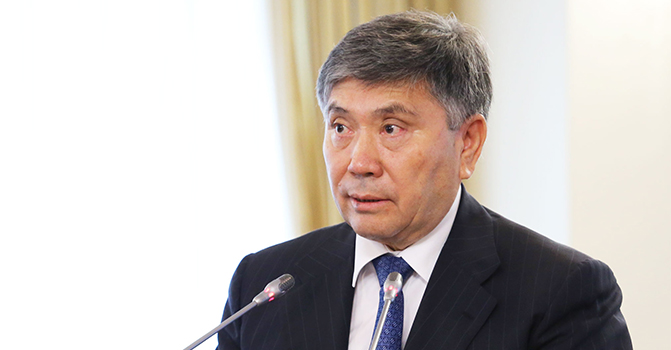Kashagan field: two possible timeframes for resumption

By Aynur Jafarova
There are two possible timeframes for resumping oil production at Kazakhstan's giant Kashagan field in the Caspian Sea.
The news was announced by Kazakh Oil and Gas Minister Uzakbai Karabalin at a briefing at the Central Communications Service under the Kazakh president on July 30.
"The optimistic scenario says that the production will be
resumed in the first half of 2016.
The second possible timeframe for the resumption falls on the
second half of 2016," he said.
With recoverable oil reserves estimated at 13 billion barrels, Kashagan field is believed to be the largest oil field in the world after Prudo Bay in Alaska. Its natural gas reserves are also estimated at over 1 trillion cubic meters.
The minister went on to add that the timeframe can vary for a number of reasons.
The time of resumption of oil production will depend on the time of supply of the pipes and the availability of barges for laying the pipes. Also, before the launch of production at the field, it is necessary to buy some 200 kilometers long pipes and lay them.
"Many things will depend on the process of the restoration work. The examination of the new pipes at the manufacturing plants hasn't been completed yet under the conditions at the Kashagan field, where high corrosion resistance is required. The plant that will deliver these pipes to us conducts additional examination of the pipes in order to test their strength," Karabalin said.
The manufacturing of the pipes is expected to start in August, while the first deliveries will begin in December.
"The project budget will be worked out after the prices for the pipes are determined," he said. "The key condition for starting the restoration work is the availability of a pipe laying barge in the Caspian Sea."
The poor quality of welding or the wrong choice of a welding technology caused the emergence of cracks on the pipelines, the minister added.
Oil production in the Kashagan field started on September 11, 2013. However, operations had to be stopped on September 24 due to a gas leak in the onshore section of the gas pipeline running from Island D to the Bolashak onshore processing facility.
The Department of Emergency Situations was immediately briefed on the regulations. Production was resumed, but stopped again on October 9 after the detection of another gas leak.
Gas leak's true causes to be revealed
Karabalin also noted Oil and Gas Ministry continues its
activities to reveal the true causes of the gas leak at Kashagan
field.
"Throughout half a year, we [the Oil and Gas Ministry] have been
engaged in revealing the true causes of the gas leak at Kashagan.
However, we and the contractors see different causes and we
continue our own investigation," Karabalin said.
He added the Kazakh side has claims against the contractors for the
quality and technology of the welding.
"The contractor conducts investigation on his own and also holds
negotiations with the supplier, that's to say, there is a
double-blind study," the minister said, adding that a negotiating
team has been created to reveal the causes of the gas leak on the
pipelines.
"London hosted the second meeting last week, during which we
discussed all the arguments and controversies. I mean the
negotiations are underway and all should reach a common
understanding," Karabalin stressed.
The Kashagan shareholders are Eni, ExxonMobil, Royal Dutch Shell, France's Total and Kazakh state oil company KazMunaiGas (KMG), each with 16.8 percent, and Japan's Inpex and China National Petroleum Corp. (CNPC) as junior partners.
30-million-dollar compensation for delay
Karabalin went on to say that the amount of compensation to Kazakhstan from the project's contractors for the delay in oil production at the Kashagan field will amount to $30 million for each quarter.
"In accordance with the agreement signed in 2012 between the Kazakh government and the project contractors, the payments from contractors for delay of the Kashagan project will make up $30 million on a quarterly basis," he said.
Kashagan shouldn't be discredited
Karabalin believes despite the next postponement of start of oil production, it is difficult to discredit the Kashagan field.
"It is difficult to discredit the Kashagan field. This is one of the largest oil fields in the world, professionals are well aware of its potential, which every country would like to have," he said.
Karabalin said only dilettantes can be pessimistic about the Kashagan field.
"We could believe the pessimists if there were not the Tengiz field which has as high a pressure and sulfur content as Kashagan," he noted. "Today Tengiz plays an important role in Kazakhstan's economy. The revenues from the oil production amounted to $12 million in 2013. Kashagan is similar to it in terms of its conditions; simply it is necessary to properly organize the work there."
Kazakhstan, one of the five Central Asian countries, is rich with hydrocarbon reserves. The Tengiz oil field was discovered in 1979. It is one of the deepest and largest oil fields in the world. Its oil reserves are estimated at 750 million to 1.1 billion tons (6-9 billion barrels) of recoverable oil.
Here we are to serve you with news right now. It does not cost much, but worth your attention.
Choose to support open, independent, quality journalism and subscribe on a monthly basis.
By subscribing to our online newspaper, you can have full digital access to all news, analysis, and much more.
You can also follow AzerNEWS on Twitter @AzerNewsAz or Facebook @AzerNewsNewspaper
Thank you!
